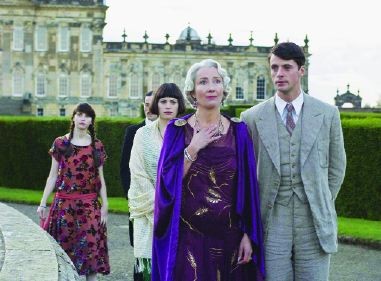Brideshead Revisited

Evelyn Waugh’s marvelous novel Brideshead Revisited begins as a coming-of-age story. At Oxford in the 1920s Charles Ryder crosses paths with the disarming, childlike aristocrat Sebastian Flyte; they become inseparable friends, and Charles is taken up by Sebastian’s family. He becomes a frequent visitor to Brideshead, the gracious old estate ruled by Sebastian’s devout Catholic mother, Lady Marchmain, and is invited to Venice as a guest of Sebastian’s father, the renegade Lord Marchmain, who resides there with his longtime Italian mistress.
This section of the book—Charles’s sentimental education, in which he falls in love with the Flytes and then loses them when Sebastian’s drinking binges turn into alcoholism—constitutes only the first half. The second half picks up, years later, after Charles has begun to establish himself as a painter and his marriage has soured. He reconnects with Sebastian’s sister Julia—now married to a boorish American—and they fall in love.
The book is a double tragedy: Charles loses his youth when his friendship with Sebastian disintegrates, and then he loses Julia, whose attachment to Catholicism prevents her from divorcing her husband to marry Charles. As Julia puts it, the words she learned in the nursery return to claim her. Waugh links the two halves of the story: Charles calls his affection for Sebastian the forerunner of his love for Julia.
But Andrew Davies and Jeremy Brock, the writers of the unfortunate new film version of Brideshead Revisited, invent other ways to connect these two parts of the tale—ways that distort Waugh’s story. They make Sebastian (Ben Whishaw) explicitly homosexual (in the book, his attachments are platonic) and in love with Charles. They advance the first stirrings of romance between Charles (Matthew Goode) and Julia (Hayley Atwell) to Venice; Sebastian glimpses their first kiss, in the shadows of the canal, so it’s also the Judas kiss of betrayal. And they add an element of social ambition for Charles that is meant to motivate his attraction to both Sebastian and Julia.
These new emphases certainly distinguish the movie from the beloved 1981 British miniseries, but rethinking these relationships this way banalizes the story, as does the reduction of Lady Marchmain (Emma Thompson), a complex character in the novel, to an iron-willed tyrant who infantilizes Sebastian and uses her Catholicism as a whip to subdue all four of her children.
After a coded dinner-table query about his place in Sebastian’s Oxford set convinces Lady Marchmain that Charles is heterosexual, she approves of him as a friend for her son. But she won’t consider him as a suitor for her daughter because he’s an atheist. The movie implies that it’s she who arranges Julia’s marriage to Rex Mottram (Jonathan Cake), even though, we later learn, Rex is a social climber who converted to Catholicism to wed her, which makes him a puzzling choice.
The religious aspect of the movie is rather confused. Charles sees Sebastian’s psychic deterioration as a consequence of Lady Marchmain’s Catholicism, and the film depicts her as such a manipulative ghoul that for a long time it seems to be an indictment of Catholicism. Yet the filmmakers remove the ambiguity in the scene in which her estranged husband makes a deathbed return to the church. Moreover, Charles’s voice-over at the end bemoans the gap in his life that faith has supplied for the Flytes, and the final image of him walking away from the abandoned Brideshead chapel, shot through the hazy glow of a candle he’s just lit, implies that God has plans for him too.
The movie, which was shot by Jess Hall, is pictorial but not especially interesting to look at. The scenes in Morocco, where Charles sees Sebastian for the last time, are a series of old-movie visual clichés, with crowded markets and sinister Arabs in djellabas. The director, Julian Jarrold, gives himself away here and in the abbreviated love scene between Charles and Julia, which is scored to swoony romantic music and veers close to high camp. His imagination is second-rate and fed by bad movies; he seems to want to make an old-fashioned romantic melodrama as well as a revisionist Brideshead. The two impulses collide. It’s hard to envision an audience that this movie would satisfy.





